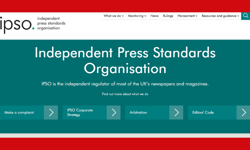England and Wales Cricket Board v The Guardian
Complaint
The England and Wales Cricket Board (the ECB) complained to the Press Complaints Commission that, in an interview with the cricketer Michael Carberry, the newspaper had inaccurately suggested that the ECB’s denial of Mr Carberry’s request that it pay for his mother to accompany him on a recent Ashes tour was a sign of managerial insensitivity, or evidence that he had been treated differently to other players, in breach of Clause 1 (Accuracy) of the Editors’ Code of Practice.
Resolution
Whilst the newspaper did not accept a breach of the Code, the complaint was resolved after the PCC negotiated the publication of the following clarification, in print and online:
‘The Guardian would like to clarify that the England Test batsman Michael Carberry (“I’m disappointed the selectors haven’t fronted up and spoken to me”, Sport, Page 6, Tuesday 1 April) was not alone in not having family members flown in to Australia at the ECB’s expense during last winter’s ashes tour. Five other players were in a similar position and the arrangement was solely for players with wives or long-term partners.’ (Cl 1)
Portes v Evening Standard
Complaint
Mr Jonathan Portes complained to the Press Complaints Commission that the newspaper had published an inaccurate claim in breach of Clause 1 (Accuracy) of the Code. The complainant said that the article incorrectly said: “under the last government, most new jobs went to EU workers”. The net increase in UK employment between May 1997 and May 2010 was over two million; the net increase in the employment of EU workers was about 700,000.
Resolution
The complaint was resolved when the PCC negotiated the amendment of the online article to make clear that, under the last parliament of the last government, the total number of EU workers in the UK jobs market rose more quickly than it has done in the four years since then, and that employment levels among UK citizens had fallen between 2005 and 2010. It published the following footnote to the article:
Clarification: The third paragraph of this item has been amended. It originally referred to the “last government”, in reference to the Labour ministry of 2005-2010: that phrase might have been taken to mean the entire period of Labour’s government from 1997 so has been changed to “the last parliament of the previous government”.
In addition, while the number of UK citizens in work at the time of the 2010 general election was around three quarters of a million lower (25.055m) than at the time of the 2005 election; and while the number of EU citizens employed in Britain rose by about half a million (to 1.353m) between the same two dates; it is not the case that “most new jobs” during that period went to EU workers, as we originally stated.
This is because during the period in question (just as with any given period) people were hired and fired in their thousands every week, even every day. The natural churn of the jobs market make the net rises and falls pale by comparison. Of the millions of ‘new hires’ between 2005 and 2010, most (up to around 85%, according to Labour Force Survey microdata) were of British citizens. In light of this, we have amended the last sentence so that it better reflects the situation.
The newspaper published the following correction in the print edition of the newspaper:
An item of May 27 (‘London and the rest of England – two states’) referred to “most new jobs” having gone to EU workers between May 2005 and May 2010. In fact, of the millions of jobs taken up during that period, the majority went to British citizens. However, it is also the case that between the two dates the overall rise in the number of EU citizens in work in the UK was around half a million; the number of Britons in employment fell overall by three-quarters of a million. We are happy to clarify matters. (Cl 1)
Soulsby v Metro
Complaint
Ms Cassandra Soulsby complained to the Press Complaints Commission, under Clause 1 (Accuracy) of the Editors’ Code of Practice, that a graphic accompanying an article about cancer rates gave the misleading impression that breastfeeding increases the likelihood of developing cancer.
Resolution
The complaint was resolved when the newspaper published the following wording:
A graphic accompanying yesterday’s story about cancer rates suggested that more than 40% of cases were linked to breast feeding and other causes. In fact, breast feeding has been linked to lowering rates of cancer, both in nursing mothers and nursing babies. Further information is available at http://www.cancerresearchuk.org/cancer-help/about-cancer/cancer-questions/how-is-breast-feeding-related-to-breast-cancer (Cl 1)
Radic v Scottish Daily Mail
Complaint
Mr Todor Radic complained to the Press Complaints Commission about an article which he considered to have been inaccurate and misleading in breach of Clause 1 (Accuracy) of the Editors’ Code of Practice.
The complainant believed readers had been misled because an article about NHS expenditure on high-fluoride toothpaste failed to note that it was only available on prescription.
Resolution
The complaint was resolved when the PCC negotiated the publication of the following correction:
An article on 24 March reported that the NHS spends £800,000 on four brands of toothpaste a year. We have been asked to clarify that ‘Duraphat’, one of these high fluoride toothpastes, is a prescription-only treatment to protect the teeth from decay as a result of having Xerostomia. (Cl 1)
McGee v Manchester Evening News
Complaint
Mr Paul McGee complained to the Press Complaints Commission about an article which he considered to have been inaccurate and misleading in breach of Clause 1 (Accuracy) of the Editors’ Code of Practice.
The complainant said it was not the case that he had given a “two-hour seminar organised by Salford council”, as the article claimed.
Resolution
The complaint was resolved when the PCC negotiated the publication of the following correction:
On May 6, 2014, we published an article which stated that Mr Paul McGee, Managing Director, PMA International Ltd, had delivered and spoken at an event organised by Salford council. We quoted comments from attendees relating to the performance of the speaker which we acknowledge did not relate to Mr McGee. We would like to correct the report and confirm that Mr McGee neither attended, nor spoke at the event. The Manchester Evening News offers its apologies to Mr McGee for the inaccuracies and any inconvenience caused. (Cl 1)
Robinson v Huffington Post
Complaint
Mr Gary Robinson complained to the Press Complaints Commission that the newspaper had breached Clause 1 (Accuracy) of the Editors’ Code of Practice. The newspaper had published a story about a tweet which the complainant had posted, and he said that the article misrepresented the point which he had been making in the tweet.
Resolution
The complaint was resolved when the PCC negotiated the removal of the article from the newspaper’s website. (Cl 1)
Woods v Daily Mirror
Complaint
Mrs Heather Woods complained to the Press Complaints Commission, under Clause 1 (Accuracy) and Clause 3 (Privacy) of the Editors’ Code of Practice, that an article about police officers who had been killed on duty had included a photograph of her, rather than her sister. She was also concerned that the use of the photograph represented an intrusion into her privacy.
Resolution
The complaint was resolved when the newspaper changed the photograph in the article and contacted the Press Association to make them aware that the image had been incorrectly marked. (Cl 1, 3)










